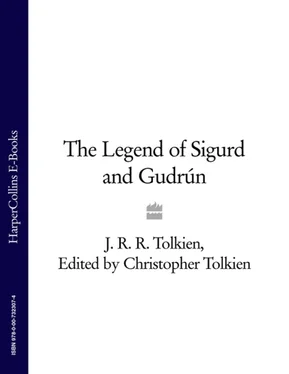J. Tolkien - The Legend of Sigurd and Gudrún
Здесь есть возможность читать онлайн «J. Tolkien - The Legend of Sigurd and Gudrún» — ознакомительный отрывок электронной книги совершенно бесплатно, а после прочтения отрывка купить полную версию. В некоторых случаях можно слушать аудио, скачать через торрент в формате fb2 и присутствует краткое содержание. Жанр: Старинная литература, на английском языке. Описание произведения, (предисловие) а так же отзывы посетителей доступны на портале библиотеки ЛибКат.
- Название:The Legend of Sigurd and Gudrún
- Автор:
- Жанр:
- Год:неизвестен
- ISBN:нет данных
- Рейтинг книги:5 / 5. Голосов: 1
-
Избранное:Добавить в избранное
- Отзывы:
-
Ваша оценка:
- 100
- 1
- 2
- 3
- 4
- 5
The Legend of Sigurd and Gudrún: краткое содержание, описание и аннотация
Предлагаем к чтению аннотацию, описание, краткое содержание или предисловие (зависит от того, что написал сам автор книги «The Legend of Sigurd and Gudrún»). Если вы не нашли необходимую информацию о книге — напишите в комментариях, мы постараемся отыскать её.
The Legend of Sigurd and Gudrún — читать онлайн ознакомительный отрывок
Ниже представлен текст книги, разбитый по страницам. Система сохранения места последней прочитанной страницы, позволяет с удобством читать онлайн бесплатно книгу «The Legend of Sigurd and Gudrún», без необходимости каждый раз заново искать на чём Вы остановились. Поставьте закладку, и сможете в любой момент перейти на страницу, на которой закончили чтение.
Интервал:
Закладка:
The full working of this curse is only hastened by Ódin’s own interventions – to provide Sigurd with horse and weapon fit for his task, and to provide him with a fit bride, the fairest of all Ódin’s Valkyries, Brynhild. (It appears that Ódin purposes through Sigurd to punish the family of Hreidmar (Fáfnir and Regin) for the exaction of the ransom of Otr.) In the story of Sigurd
Here this text breaks off.
(ii)
Grímhild, wife of Gjúki King of the Burgundians (or Niflungs), is the chief agent of evil, not because of any farsighted plans of wickedness: she is rather an example of that wickedness that looks only to each situation as it occurs, and sticks at nothing to gain from it what seems immediately profitable. She is ‘grey with wisdom’ being a witch in lore and still more skilled in the reading of minds and hearts to use their weaknesses and follies. Her will dominates her daughter Gudrún and her oldest son Gunnar.
Gudrún is a simple maiden, incapable of any great plans for profit or vengeance. She falls in love with Sigurd, and for herself has no further motive. A sensitive but weak character, she is capable of disastrous speech or action under provocation. The occasions of this that are described are her fatal retort to the taunting of Brynhild, which more than anything is the immediate cause of Sigurd’s murder, and in the sequel, the Slaying of the Niflungs, her terrible deeds at the end when driven to madness and despair.
Gunnar is a hot impatient character, dominated by Grímhild. Though not too stupid to perceive prudence, in cases of doubt or difficulty he becomes fey and reckless, turning to violence.
(iii)
After Sigurd was slain, Brynhild took her own life, and they were both burned on one pyre. Gudrún did not take her own life, but for grief was for a time half-witless. She would not look upon her kinsmen nor upon her mother, and dwelt apart in a house in the woods. There after a while she began to weave in a tapestry the history of the Dragon-hoard and of Sigurd.
Atli son of Budli became king of the Huns, ancient enemies of the Burgundians, who had before slain his father. *His power growing great becomes a threat to Gunnar, who is now king in his father Gjúki’s stead; and as Högni his brother had foretold they miss now the valour of King Sigurd their sworn-brother.
(iv)
This lay [i.e. Guðrúnarkviða en nýja ] is a sequel to the Lay of Sigurd and assumes knowledge of it, though by the device of Gudrún’s tapestry the history of the accursed Hoard and of Sigurd is brought to mind and outlined at the beginning.
In the former Lay it was told how the dominion of the Gods was from the first threatened with destruction. Ódin, Lord of Gods and Men, begets in the world many mighty men, whom he gathers in Valhöll to be his companions in the Last Battle. One family in especial he singles out, the Völsungs, *all of whom are his chosen warriors, and one, Sigurd son of Sigmund, is to be the chief of all, their leader in the Last Day; for Ódin hopes that by his hand the Serpent shall in the end be slain, and a new world made possible.
None of the Gods can accomplish this, but only one who has lived on Earth first as a mortal, and died. (This motive of the special function of Sigurd is an invention of the present poet, or an interpretation of the Norse sources in which it is not explicit.)
Evil is not, however, to be found only in the ever-watchful host of the Enemies of Gods and Men. It is found also in Ásgard itself in the person of Loki, by whose deeds, wilful, merely mischievous, or wholly malicious, the counsels and hopes of Ódin seem ever turned awry or defeated.
Yet Loki is seen ever walking the world at the left hand of Ódin, who does not rebuke him, nor dismiss him, nor refuse the aid of his cunning. At Ódin’s right hand there walks another figure, a nameless shadow. It would seem that this poet (seeing that the Northern Gods represent but written large the ways of Men in the hostile world) has taken this old legend to symbolize Man’s prudence and wisdom and its ever present accompaniment of folly and malice that defeats it, only to bring forth greater heroism and deeper wisdom; while ever at the right hand walks the shadow that is neither Ódin nor Loki but in some aspect Fate, the real story that must be blended of both. Yet Ódin is master of the Three and the final outcome will resemble rather the hope of Ódin than the malice (shorter sighted) of Loki. Ódin at times gives expression to this, saying that his hope looks out beyond the seeming disasters of this world. Though Ódin’s chosen come all to an evil end or untimely death, that will only make them of greater worth for their ultimate purpose in the Last Battle. On this in many ways mysterious writing see the commentary on the Upphaf of the Lay of the Völsungs, and the commentary on the first section of the poem, Andvari’s Gold, stanza 1.
In conclusion, this seems a suitable place to refer to remarks of my father’s that bear upon, but have no (at any rate overt) relation to, Guðrúnarkviða en nýja. In his introduction to lectures at Oxford on the Eddaic poem Guðrúnarkviða en forna , the Old Lay of Gudrún, he said that ‘curiously enough’ he was more interested in Gudrún, ‘who is usually slighted, and considered as of secondary interest’, than in Brynhild. By implication, he contrasted the long agony of Gudrún with the irruption of Brynhild, who soon departs, ‘and her passion and death remain only in the background of the tale, a brief and terrible storm beginning in fire and ending in it.’
VÖLSUNGAKVIÐA EN NÝJA
eða
SIGURÐARKVIÐA EN MESTA

VÖLSUNGAKVIÐA EN NÝJA
UPPHAF
(Beginning)
1
Of old was an age
when was emptiness,
there was sand nor sea
nor surging waves;
unwrought was Earth,
unroofed was Heaven –
an abyss yawning,
and no blade of grass.
2
The Great Gods then
began their toil,
the wondrous world
they well builded.
From the South the Sun
from seas rising
gleamed down on grass
green at morning.
3
They hall and hallow
high uptowering,
gleaming-gabled,
golden-posted,
rock-hewn ramparts
reared in splendour,
forge and fortress
framed immortal.
4
Unmarred their mirth
in many a court,
where men they made
of their minds’ cunning;
under hills of Heaven
on high builded
they lived in laughter
long years ago.
5
Dread shapes arose
from the dim spaces
over sheer mountains
by the Shoreless Sea,
friends of darkness,
foes immortal,
old, unbegotten,
out of ancient void.
6
To the world came war:
the walls of Gods
giants beleaguered;
joy was ended.
The mountains were moved,
mighty Ocean
surged and thundered,
the Sun trembled.
7
The Gods gathered
on golden thrones,
of doom and death
deeply pondered,
how fate should be fended,
their foes vanquished,
their labour healed,
light rekindled.
8
In forge’s fire
of flaming wrath
was heaviest hammer
hewn and wielded.
Thunder and lightning
Thór the mighty
flung among them,
felled and sundered.
9
In fear then fled they,
foes immortal,
from the walls beaten
watched unceasing;
ringed Earth around
with roaring sea
and mountains of ice
on the margin of the world.
Читать дальшеИнтервал:
Закладка:
Похожие книги на «The Legend of Sigurd and Gudrún»
Представляем Вашему вниманию похожие книги на «The Legend of Sigurd and Gudrún» списком для выбора. Мы отобрали схожую по названию и смыслу литературу в надежде предоставить читателям больше вариантов отыскать новые, интересные, ещё непрочитанные произведения.
Обсуждение, отзывы о книге «The Legend of Sigurd and Gudrún» и просто собственные мнения читателей. Оставьте ваши комментарии, напишите, что Вы думаете о произведении, его смысле или главных героях. Укажите что конкретно понравилось, а что нет, и почему Вы так считаете.












